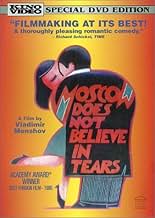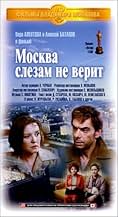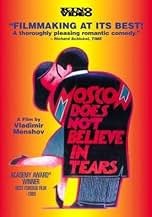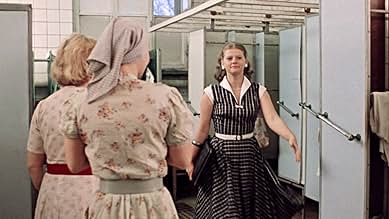AVALIAÇÃO DA IMDb
8,0/10
15 mil
SUA AVALIAÇÃO
Esta é a história de vida de três noivas desde a juventude até o outono. Seus sonhos e desejos, amor e decepções.Esta é a história de vida de três noivas desde a juventude até o outono. Seus sonhos e desejos, amor e decepções.Esta é a história de vida de três noivas desde a juventude até o outono. Seus sonhos e desejos, amor e decepções.
- Direção
- Roteiristas
- Artistas
- Ganhou 1 Oscar
- 3 vitórias e 1 indicação no total
Vladlen Paulus
- Pyotr Lednev
- (as V. Paulus)
- Direção
- Roteiristas
- Elenco e equipe completos
- Produção, bilheteria e muito mais no IMDbPro
Avaliações em destaque
Vladimir Menshov's well-balanced 'Moscow does not believe in tears' provides a moving story about human warmth. About fortunes and misfortunes that can befell anyone of us -- enabling us to identify easily.
This film also is about a very East European female eagerness to hunt after Mr. Right. Pressure is on, for in Communist society failure usually meant a lifelong condemnation to a poor, worried, boring and tiring life in some drab Russian provincial town. With a big possibility that your husband would booze himself up too much.
No doubt this film's acting makes its strongest feature. Its uninterrupted, breathtaking quality convincingly carries you back some fifty years in time. To Moscow, the capital of the USSR. Although this Communist society has been gone for a long time, 'Moscow does not believe in tears' will easily get you back there.
This film also is about a very East European female eagerness to hunt after Mr. Right. Pressure is on, for in Communist society failure usually meant a lifelong condemnation to a poor, worried, boring and tiring life in some drab Russian provincial town. With a big possibility that your husband would booze himself up too much.
No doubt this film's acting makes its strongest feature. Its uninterrupted, breathtaking quality convincingly carries you back some fifty years in time. To Moscow, the capital of the USSR. Although this Communist society has been gone for a long time, 'Moscow does not believe in tears' will easily get you back there.
Moscow Does Not Believe In Tears is an appealing comedy-drama with much to say about Soviet society from the 1950s to the 1970s. The cast deliver standout performances, and this is the film's greatest strength. The story is about their lives. The city's scenery is often featured, with cinematography that's good for a Soviet drama film. The score, however, is standard fare, but there are a few notable songs. Considering its high entertainment value it's no wonder that Moscow Does Not Believe In Tears became one of the most popular films in the Soviet Union. It even won an Academy Award for Best Foreign Language Film in 1980. It's just one of those films where everyone involved in making it contributed to a result that delivers on all fronts. If the acting or the direction was worse then the result could have been another forgettable drama. Soviet filmmakers, however, specialized in drama films. This is because of the restrictions that were put on them by the government. Many good dramas were released during the Soviet period, and Moscow Does Not Believe In Tears is one of the most memorable. I definitely recommend seeing it.
This is a tribute to the Soviet era some people in Ukraine still consider to be the best years of their lives.I saw the movie in my child years, but didn't pay much attention to it. Now, when I study film history and techniques, the movie revealed to me some dark sides. "Moskva sliezam nie verit", I guess, tells a story of a humble Soviet woman in pursuit for happiness with a beloved man. This woman does not care about feminism. True love of a man-"stronghold", a man who is ready to comfort her any time she needs--that is what she is searching for in life. The movie shows some cloudy moments in the way to happiness three female friends go along. And the movie ends up where it should--an "island of placid" I watch it in original. Have to say, many phrases from the movie are cited in Ukrainian and Russian-speaking communities these days.
Culturally interesting since this occurs in a Communist country that US propaganda gave little insight on the values and realities of the people. We see idealistic poets who say the older generation made mistakes, women promoted to executive positions, a film produced by the State yet approaching sexual themes, Western idolization, the drudgery of repetitive industrial work, and class distinctions between the haves and have-nots.
Also of interest is the protagonist's view of herself. Without revealing plot twists, it is suffice to say that a woman is socially seen as submissive to the man. This is a shock to Western sensibilities of women's equality, especially as we see her ordeals as a result of a man's selfishness and dominance. What is revealing is that she, herself does not rebel against the System. She works within the parameters, creates her own success, and becomes transformed.
Being Western, I found myself questioning whether she had truly achieved something. The crown of achievement, we are taught, is independence, equality. Whereas she achieved that in a career and in her lifestyle, in her heart, she yearned for a man, to be the little wife, and to submit herself to a patriarchal marriage. But, in the end, who are we to judge another's happiness?
Also of interest is the protagonist's view of herself. Without revealing plot twists, it is suffice to say that a woman is socially seen as submissive to the man. This is a shock to Western sensibilities of women's equality, especially as we see her ordeals as a result of a man's selfishness and dominance. What is revealing is that she, herself does not rebel against the System. She works within the parameters, creates her own success, and becomes transformed.
Being Western, I found myself questioning whether she had truly achieved something. The crown of achievement, we are taught, is independence, equality. Whereas she achieved that in a career and in her lifestyle, in her heart, she yearned for a man, to be the little wife, and to submit herself to a patriarchal marriage. But, in the end, who are we to judge another's happiness?
Moving story of three young girls who come to the capital of Soviet Russia in search of their fate. They play rich girls to impress the guys, and succeed in doing so. Katya (the protagonist) does not like the game, but still goes with the girls. But the truth is soon revealed, and Katya's boyfriend breaks up with her. She is pregnant and has to raise a kid alone in a tiny dorm room, and still try to get an education.
The second part shows the three girlfriends 20 years later. Katya is a very successful business lady and has a wonderful daughter. But she hasn't found real love, and the story takes a new turn when she meets Gosha in a train. They both now have to find ways into each other's established lives. A very nice and sincere story that people watch over and over again!
The second part shows the three girlfriends 20 years later. Katya is a very successful business lady and has a wonderful daughter. But she hasn't found real love, and the story takes a new turn when she meets Gosha in a train. They both now have to find ways into each other's established lives. A very nice and sincere story that people watch over and over again!
Você sabia?
- CuriosidadesOne of four Russian films ever to win Academy Award for Best Foreign Language Film. The other are Guerra e Paz (1965), Dersu Uzala (1975) and O Sol Enganador (1994).
- Erros de gravaçãoWhen Lyudmila and her friend approach the office building she is wearing a pair of white shoes. Once inside the building the shoes color changes to black.
- Citações
Lyudmila Gurina: Don't cry.
Lyudmila Gurina: You know what Moscow thinks of tears.
Lyudmila Gurina: We shouldn't be sitting around, we should do something.
- ConexõesFeatured in Amor e Pombos (1985)
- Trilhas sonorasAleksandra, Aleksandra
Written by Sergey Nikitin and Dmitry Suharev and Yuri Vizbor
Performed by Tatyana Nikitina and Sergey Nikitin
Principais escolhas
Faça login para avaliar e ver a lista de recomendações personalizadas
- How long is Moscow Does Not Believe in Tears?Fornecido pela Alexa
Detalhes
- Data de lançamento
- País de origem
- Central de atendimento oficial
- Idioma
- Também conhecido como
- Moscow Does Not Believe in Tears
- Locações de filme
- Empresas de produção
- Consulte mais créditos da empresa na IMDbPro
Bilheteria
- Orçamento
- US$ 900.000 (estimativa)
- Faturamento bruto mundial
- US$ 217
- Tempo de duração
- 2 h 30 min(150 min)
- Proporção
- 1.37 : 1
Contribua para esta página
Sugerir uma alteração ou adicionar conteúdo ausente






































